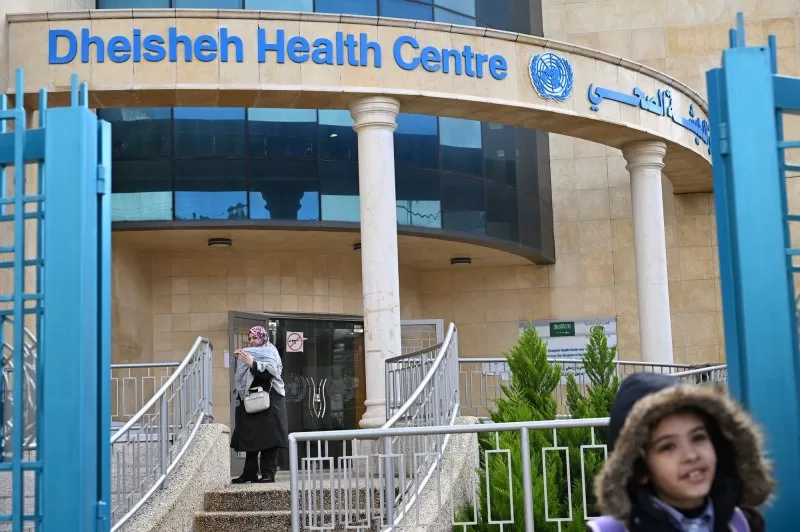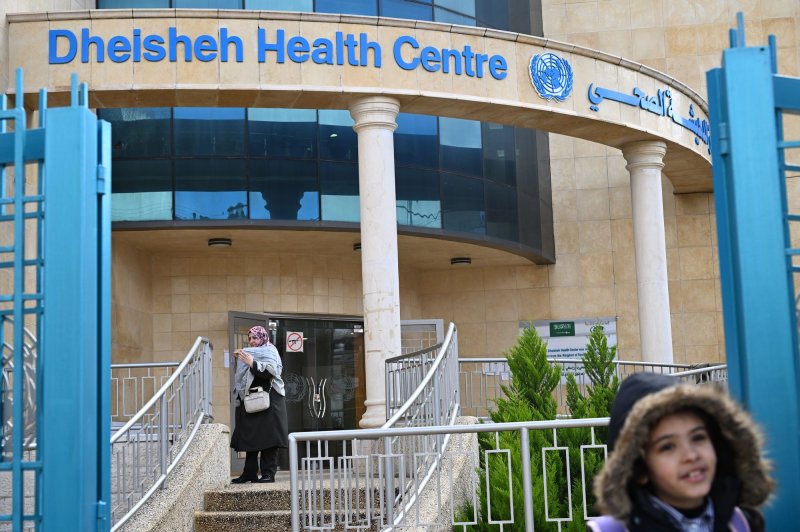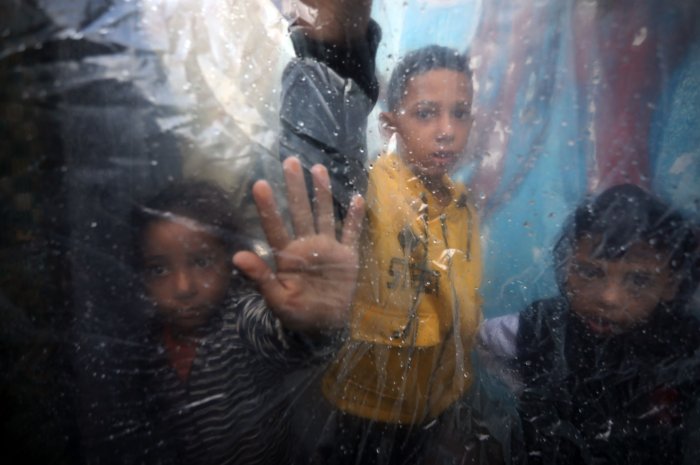1 of 8 | Palestinian refugees stand outside the entrance to the United Nations Relief and Works Agency for Palestinian Refugees Health Clinic in the Dheisheh refugee camp near Bethlehem, West Bank, on Tuesday. Photo by Debbie Hill/UPI |
License PhotoFeb. 1 (UPI) — The United Nations Relief Works Agency for Palestine Refugees in the Near East is embroiled in controversy after Israel reported a dozen of the agency’s employees directly participated in the Oct. 7 Hamas attack on Israel.
The report prompted 16 nations to suspend funding to the UNRWA, which provides aid in Gaza, the West Bank, Jordan, Lebanon and Syria.
U.N. Secretary-General Antonio Guterres is urging donor nations to continue their support amid the war.
The “UNRWA is the backbone of all humanitarian response in Gaza,” he said.
Roots go back to 1949
The agency provides food and medicine, education, healthcare and social services, as well as emergency assistance due to armed conflicts and financial assistance.
The UNRWA was created at the end of the first Arab-Israeli conflict in the Middle East in 1948, and its mission hasn’t changed — to assist the Palestinian refugees of the 1948 war.
The U.N. General Assembly on Nov. 29, 1947, adopted the Partition Resolution that created Jewish and Arab states from what had been Great Britain’s Palestinian Mandate territory, according to the U.S. Department of State. The leaders of the Arab states viewed the Partition Resolution as favorable to Israel and unfair to the Arab populations living within Israeli territory, and conflict erupted.
Israel declared its independence on May 14, 1948. In response, five Arab nations formed the Arab Liberation Army, which attacked Israeli cities, settlements and its military. Volunteers from neighboring Arab states manned the ALA and other irregular forces during the conflict.
The Arab militants attacked Tel Aviv, Israel, on the night of May 14, 1948, and armies from Lebanon, Syria, Iraq and Egypt attacked the former Palestinian territory. Israeli forces resisted and eventually gained the initiative in the conflict, which lasted into 1949.
The warring states agreed to an armistice and lines of division that remained in place until the 1967 Arab-Israeli war. Meanwhile, the United Nations on Dec. 8, 1949, created the UNRWA and tasked it with providing direct relief and works programs serving Palestinian refugees.
The UNRWA began operations on May 1, 1950, to tend to refugees of Palestinian descent and provide them with humanitarian aid and other services. The United Nations has since continually renewed and funded the UNRWA.
Its services are available only for Palestinian refugees, which the United Nations defines as “persons whose normal place of residence was Palestine” from June 1, 1946, to May 15, 1948, and “who lost both home and means of livelihood as a result of the 1948 war.”
6 million eligible
After the 1967 Six-Day War, the United Nations expanded the UNRWA’s mandate to help all Palestinian refugees created due to ongoing Middle East conflicts.
In the beginning, the agency provided services for 750,000 Palestinian refugees. Four generations later, eligibility has swollen to nearly 6 million. Its services are supported by donations from U.N. member states, many of which suspended their funding in light of accusations of terrorist activities by UNRWA workers.
Israel released a report Friday that accuses 12 UNRWA workers of being involved in Hamas’ Oct. 7 attack on Israel, naming seven accused of participating in the surprise raid that killed about 1,200. More than 200 others were kidnapped, with about 130 still held in hostage in Gaza.
The Israeli report said 190 or more UNRWA workers and about 10% of the agency’s 13,000 employees are members of Hamas, the Islamic Jihad or similar organizations.
The United States, United Kingdom and Japan are among 16 nations that suspended their financial support of the agency in the wake of the report. The UNRWA said it fired 11 of the identified employees; one is dead.
The agency said this week it only has enough funding to continue operating until the end of February.
The UNRWA in 2022 obtained $1.17 billion in pledged support and another $44.6 million from the United Nations and U.N. entities, the agency said. Private partnerships also provided $15.4 million in financial support to the UNRWA in 2022.
Other relief agencies also are assisting Palestinian refugees in Gaza. They include the International Federation of Red Cross and Red Crescent Societies, the Egyptian Red Crescent Society and the Palestine Red Crescent Society, according to the International Red Cross.
UNICEF also is providing aid.
Palestinian children take shelter from the rain under a tent. Photo by Ismael Mohamad/UPI |
License Photo


